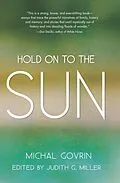The Israeli author's poetry, essays, and stories on the haunting legacy of WWII "swirl mystically out of history and into dazzling floods of wonder" (Don DeLillo, author of White Noise).
In this portrait of the artist as a young woman, one of Israel's most acclaimed contemporary writers weaves together a kaleidoscope of fiction, poetry, and essays. Populated by both fictional and real people, each tale is in some way a search for meaning in a post-Holocaust world.
Reminiscent of W.G. Sebald, characters irrationally and humanely find reason for hope in a world that offers little. Essays describe Govrin's visits to Poland as a young adult, where her mother had survived a death camp, but had lost her husband and their child, Govrin's half-brother. Capturing the depths of denial and the exuberance of youth in a multiplicity of voices, this haunting collection "joins the few serious books that try through artistic means to face the unspeakable" (Aharon Appelfield, author of Badenheim 1939).
Autorentext
Now residing in Jerusalem, Govrin teaches at the School of Visual Theater and is the academic chair of the Theater Department of Emunah College, both in Jerusalem. She has taught at the Hebrew University of Jerusalem, presents an annual lecture at The Cooper Union School of Architecture in New York, and is a former Writer in Residence and Aresty Senior Visiting Fellow at the Center for the Study of Jewish Life at Rutgers University.
Judith G. Miller is a professor and former chair of French at New York University. She has written extensively on French and Francophone theatre, including a recent book on theatre director Ariane Mnouchkine. She also translates plays from the French, most recently excerpts of plays by Hélène Cixous (with an introductory essay) for Columbia University Press.
Klappentext
In this portrait of the artist as a young woman, Michal Govrin, one of Israel's most important contemporary writers, offers a kaleidoscope of stories and essays. Populated by mysterious and real people, each tale is in some way a search for meaning in a post-Holocaust world. Reminiscent of W.G. Sebald, characters irrationally and humanely find reason for hope in a world that offers little. Essays describe Govrin's visits to Poland as a young adult, where her mother had survived a death camp. Govrin journeys there after she learns that her mother had not been alone. She lost her first husband and eight-year-old son, Govrin's half brother, and kept it a secret from her second family for many years. In a multiplicity of voices, Govrin's haunting stories capture the depths of denial and the exuberance of youth.
Michal Govrin is the author of eight books of fiction and poetry. Her novel The Name won the Kugel Literary Prize in Israel; her second novel Snapshots was awarded the 2003 Acum Prize for the best literary achievement of the year. Govrin has been selected by the Salon du Livre as one of the most influential writers of the past thirty years.
Inhalt
The Journey to Poland
La Promenade (Triptych)
Between Two and Four
Elijah's Birthday
Public Confession
Evening Ride
Jet Lag
The End of the Pythia
Rites of Spring
Hold on to the Sun
Selichot in Krakow: Migrations of a Melody
Afterword: Interview of Michal Govrin by Judith Miller
